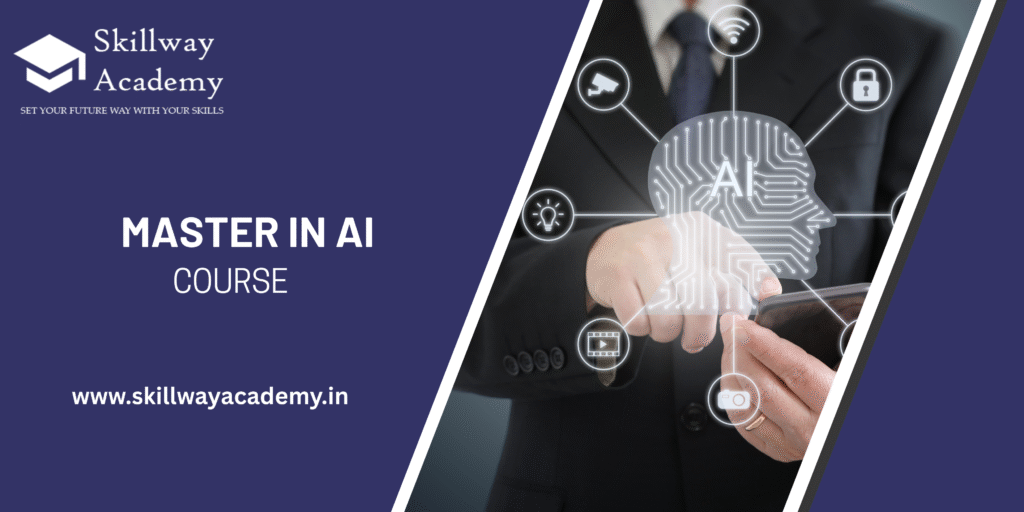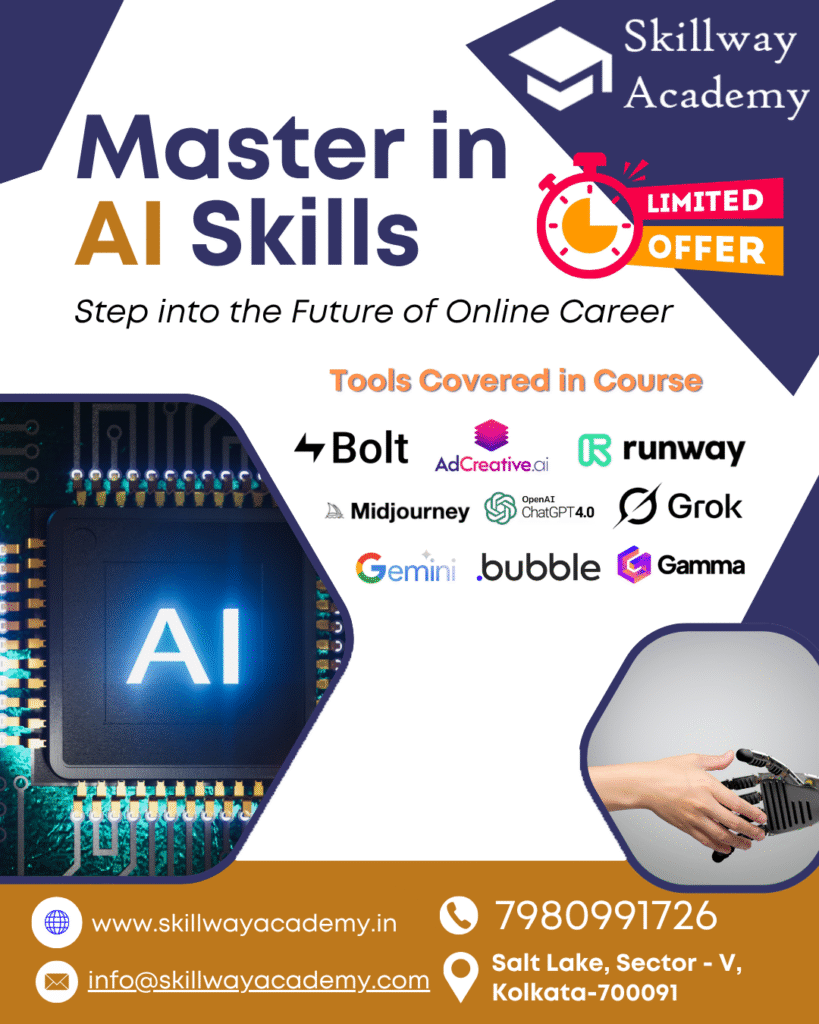Master in AI Skills 2-Month Course: Become a Pro in AI
Are you ready to transform yourself into experts in AI Tools?
Basic Course For Freshers and individuals with a foundational understanding of AI concepts)

Skillway Academy Master in AI Course is designed to Basic understanding of programming (preferably Python), linear algebra, calculus, and machine learning fundamentals.
Course Overview:
Skillway Academy provides this intensive 2-month program is designed to equip professionals and enthusiasts with advanced skills in Artificial Intelligence (AI). The curriculum covers key AI domains, including deep learning, reinforcement learning, computer vision, NLP (Natural Language Processing), and AI ethics. The course will provide hands-on experience with popular AI frameworks, such as TensorFlow, PyTorch, and scikit-learn.
By the end of the course, participants will have a deep understanding of AI principles, be able to build AI models, and deploy AI-based solutions to solve real-world problems.
Week 1: Introduction to Advanced AI Concepts
Saturday (Day 1): Advanced Machine Learning – Part 1
Overview of Advanced ML Techniques:
Shallow vs. Deep Learning, Ensemble Learning.
Key optimization algorithms: Gradient Descent, Adam.
Supervised Learning:
Regression and Classification: Decision Trees, SVM, KNN.
Sunday (Day 2): Advanced Machine Learning – Part 2
Unsupervised Learning:
Clustering algorithms (K-Means, DBSCAN), Dimensionality Reduction (PCA, t-SNE).
Semi-supervised Learning:
Combining labeled and unlabeled data.
Hands-on with Algorithms:
Implement XGBoost and SVM on real datasets.
Model evaluation metrics (Cross-validation, ROC-AUC).
Week 2: Mathematics for AI
Saturday (Day 3): Linear Algebra & Matrix Operations
Tensors & Matrix Operations:
Eigenvectors, Singular Value Decomposition (SVD).
Matrix multiplication, broadcasting, and their importance in AI.
Applications in AI:
Dimensionality reduction (PCA), optimization techniques.
Sunday (Day 4): Calculus and Probability for AI
Calculus for Optimization:
Gradients, Chain Rule, and Backpropagation in Neural Networks.
Probability Theory & Bayes’ Theorem:
Conditional Probability, Bayes’ Theorem for probabilistic reasoning.
Practical Use Cases:
Applying Bayes’ Theorem in Naive Bayes classification.
Week 3: Deep Learning Fundamentals
Saturday (Day 5): Introduction to Neural Networks
Neural Network Architecture:
Components: Neurons, Activation Functions, Layers (Dense, ReLU, etc.).
How backpropagation works for training.
Optimization & Regularization:
Optimization algorithms: SGD, Adam.
Overfitting and regularization techniques (Dropout, L2).
Sunday (Day 6): Convolutional Neural Networks (CNNs)
CNN Architecture:
Convolution, Pooling, and Fully Connected layers.
Building a simple image classification model with CNN.
Applications:
Image classification, object detection, and segmentation.
Hands-on with TensorFlow or PyTorch to build CNNs.
Week 4: Natural Language Processing (NLP)
Saturday (Day 7): Introduction to NLP
Text Preprocessing:
Tokenization, stemming, lemmatization.
Text Vectorization: Bag of Words, TF-IDF, Word2Vec.
Basic NLP Tasks:
Sentiment Analysis and Text Classification.
Sunday (Day 8): Advanced NLP Techniques
Recurrent Neural Networks (RNNs) and LSTM:
Sequence modeling and applications in language processing.
Transformer Models:
Attention mechanism, BERT, GPT for advanced NLP tasks.
Hands-on with Hugging Face Transformers.
Week 5: Reinforcement Learning (RL)
Saturday (Day 9): Introduction to Reinforcement Learning
Core Concepts of RL:
Agent, Environment, Reward, Action.
Exploration vs. Exploitation.
Markov Decision Process (MDP):
Value function, Q-learning.
Sunday (Day 10): Deep Reinforcement Learning (DRL)
Deep Q Networks (DQN):
Neural networks in RL, basics of Deep Q-Learning.
Policy Gradient Methods:
REINFORCE algorithm and Actor-Critic methods.
Applications in gaming, robotics.
Week 6: Advanced AI Applications
Saturday (Day 11): Computer Vision (CV)
Advanced Computer Vision Topics:
Object detection, image generation, style transfer.
Generative Adversarial Networks (GANs):
Introduction to GANs for image synthesis.
Hands-on:
Implementing object detection with pre-trained models (YOLO, Faster R-CNN).
Sunday (Day 12): AI in Healthcare & Finance
AI in Healthcare:
AI in medical imaging, diagnostics, drug discovery.
Ethical issues in healthcare AI.
AI in Finance:
Fraud detection, algorithmic trading, risk assessment.
Week 7: AI Ethics, Governance, and Model Deployment
Saturday (Day 13): AI Ethics & Responsible AI
Ethical Issues in AI:
Bias, fairness, and transparency in AI models.
Privacy concerns (GDPR, data protection).
Explainable AI:
Techniques for interpretability of AI models.
Sunday (Day 14): AI Governance & Model Deployment
AI Regulations:
Overview of AI regulations globally (EU, US, China).
Model Deployment:
Docker, Kubernetes, and cloud platforms (AWS, GCP) for model deployment.
Continuous model monitoring and retraining.
Week 8: AI Model Deployment, Scaling, and Capstone Project
Saturday (Day 15): Scaling AI Applications
Distributed Training:
Scaling AI models using TensorFlow and PyTorch.
Edge AI:
Deploying AI models on edge devices (NVIDIA Jetson, Raspberry Pi).
Optimization for Real-time Inference:
Optimizing models for low-latency applications.
Sunday (Day 16): Capstone Project Design & Final Review
Capstone Project Work:
Define a real-world AI problem to solve (e.g., chatbot, autonomous navigation system, image classifier).
Data collection, preprocessing, and model selection.
Project Presentation & Feedback:
Present your AI project to peers and instructors.
Receive constructive feedback and discuss the potential real-world applications of your solution.
Tools & Technologies:
Python, TensorFlow, PyTorch, Keras
Scikit-learn, Pandas, Numpy
OpenCV, Hugging Face Transformers
Docker, Kubernetes, Cloud (AWS, Google Cloud)
Certification: Upon successful completion of the course and Capstone Project, participants will receive a Master in AI Skills certification, recognized by top industry partners. This certification will validate the participant’s expertise in AI tools, methodologies, and applications.
FAQ'S
Frequently asked questions
This course is designed for:
Professionals working in fields such as data science, software engineering, and IT, looking to advance their knowledge in AI.
Advanced learners who already have basic knowledge of machine learning, Python, and AI concepts and want to dive deeper into specialized topics like deep learning, reinforcement learning, and NLP.
AI enthusiasts eager to gain practical, hands-on experience in the field of AI.
The course typically takes 2 months to complete. You can go at your own pace, and you’ll have lifetime access to all course materials.
Reach Us: Skillway Academy through:
Email: info@skillwayacademy.in
Phone: Contact numbers provided on the +917980991726
Online Form: Use the contact form available on their website Contact Us for inquiries.
Yes, this course assumes you have a foundational understanding of:
Python programming.
Basic machine learning concepts such as regression, classification, and clustering.
Linear algebra and calculus fundamentals (such as gradients and optimization).
If you’re new to AI, we recommend reviewing these topics before starting the course.
The course is structured as follows:
Duration: 2 months, with classes on Saturdays and Sundays.
Class Length: Each session is 4 hours long (8 hours per week).
Content Delivery: It is a mix of lectures, hands-on coding exercises, assignments, and a capstone project.
Mode: The course is available both online and offline (hybrid), allowing flexibility in how you learn.
Yes! Every session includes hands-on coding and practical exercises. You will work with real-world datasets and implement algorithms using popular AI frameworks such as TensorFlow and PyTorch. There is also a significant emphasis on building AI models for tasks like image classification, NLP, and reinforcement learning.
Yes! Upon successfully completing the course and the Capstone Project, you will receive a Master in AI Skills Certificate. This certificate is recognized by industry professionals and can help you in career advancement or job opportunities.

